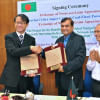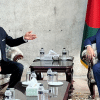Bangladesh-Japan relations on the right track

We are delighted by the increasing prospect of Japanese investors coming to Bangladesh. Over the years, the bilateral relation between the two countries has improved exponentially to the point where Japan is now one of our most integral partners. Last April, Japan's relationship with Bangladesh was upgraded to a "strategic" one from the previous comprehensive relationship, as recently emphasised by Japan's economy, trade and industry minister. As a number of Japanese companies are now looking to shift operations to various parts of Asia, the minister also said that Bangladesh has the potential to attract many of them, which would be a massive boon for investment here, and could lead to numerous added benefits such as increased job creations.
Japanese company Honda already opened its factory in Bangladesh some years ago. A Japanese information technology company, BJIT, has also started production in the country. We are, however, yet to see large-scale relocation of factories to Bangladesh, which will hopefully change once the Japan economic zone, being developed at Araihazar in Narayanganj, is complete. Additionally, the large-scale infrastructure development that has been happening in Bangladesh should inspire more foreign businesses to set up shop here to take advantage of Bangladesh's competitive advantages.
In 2022, Bangladesh received more than $100 million in investment from Japan, a record high, as the number of Japanese companies quadrupled in the country over the last decade. To take bilateral relations to the next level, both countries are now working to sign an Economic Partnership Agreement (EPA) to accelerate trade and investment. This, indeed, should be great news for all stakeholders.
However, in order to make the most of our growing economic and business relations, the Bangladesh government should conduct proper research and focus more on improving business conditions that can attract Japanese – and other – businesses to invest and conduct their manufacturing and operational activities out of Bangladesh. In terms of which sectors are showing the greatest promise, the Japanese side has already identified them. Now, it is up to our government to formulate policies in a way that can best compliment the growth of these sectors.
The decision by the Bangladesh government to set up a one-stop service centre for foreign businesses is expected to make life easier for them, and attract more of them. But there are still other ways for the government to further improve the overall business environment, and we hope that it will now shift its focus towards achieving those goals. But aside from the growing private investment, we hope to see even greater investment by the Japanese government in Bangladesh, so that the latter's goal of achieving rapid development and industrialisation can soon become a reality.


 For all latest news, follow The Daily Star's Google News channel.
For all latest news, follow The Daily Star's Google News channel. 









Comments